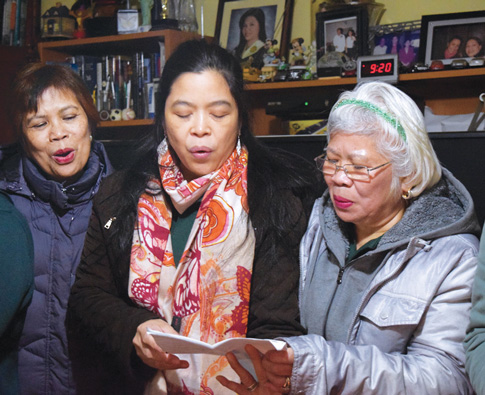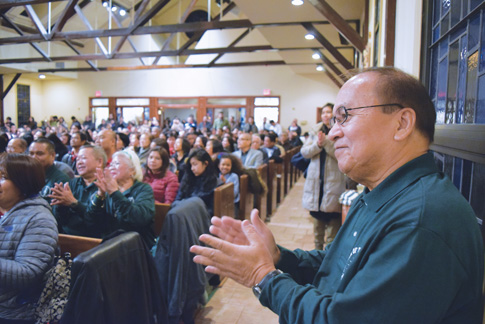
Nearly 400 people filled the pews and hallways of Ascension Church in Elmhurst to participate on the fifth Mass of Simbang Gabi, a nine-day novena of Masses to the Blessed Mother.
The Dec. 19 Mass was a way to prepare for the Nativity of Jesus, said Father Jovito Carungay, administrator. “It helps us to strengthen our hope and trust in God.”
“It’s an experience that I would never forget,” Joseph Taranto said of his first Simbang Gabi. “The way that people get together and you can see their joy.”
His fiancé, choir member Charito Clarin said the hymns in Tagalog reminded people that this season is “not about gift-giving but love giving.” In keeping with the Mass’ joyfulness, the Servants of Christ choir went caroling after Mass.
Simbang Gabi traces its roots to Mexico where, in 1587, the pope granted the petition of Fray Diego de Soria to hold Christmas Mass outdoors because churches could not accommodate the huge crowds attending the evening Mass. Spanish missionaries brought the custom to the Philippines. The pre-dawn Masses – called “misas de gallo” because they take place before the roosters sing – were announced by the ringing of the bells, with farmers and fisherman waking up early to hear the Gospel before work.
In the Philippines today, entire families often travel to the nearest church to begin the celebration of the novena Masses at 5 a.m. Streets around churches are decorated by “parols,” lanterns fashioned out of bamboo and paper that symbolize the star of Bethlehem.
(Story continues below)
“It is a sacrifice for people (to come to the consecutive Masses) in preparation for Christmas, so that they feel like they are prepared to receive the blessing that Jesus brings to us,” said Father Patrick Longalong, coordinator of the ministry to Filipinos in the Brooklyn Diocese and secretary of the National Association of Filipino Priests in the U.S.
This year, the Filipino devotion was observed in at least 13 parishes in the diocese. Many people try to attend the nine consecutive Masses because they are asking a favor from God for them or their loved ones.
“Most parishes with a large Filipino community introduce this custom to the rest of the diocese, even celebrating in English so other non-Filipinos can appreciate this tradition,” Father Longalong said. “This year is the first year that all of the bishops have taken one Simbang Gabi Mass” to celebrate.
Mahlou Macarie, a parishioner since 2009, said the congregation felt blessed to have Auxiliary Bishop Paul Sanchez come to their parish on Dec. 15. Like many Ascension parishioners, she feels united to her family in the Philippines when observing this tradition.
“When they attend Simbang Gabi here, they feel that closeness with their family,” Father Longalong said. “That unity in prayer is important for them.”

Macarie has been coming to all of the Simbang Gabi Masses at 7 p.m. to be able to pray the rosary before Mass. “After work, I come straight to the church,” she said. “It’s a wonderful preparation for Christmas and is something to look forward to.”
Woodhaven* residents Precy and Oscar De La Isla brought their whole family to the Mass, including four grandchildren and family visiting from Prague. Their happiness was doubled since their wedding anniversary falls on the fifth day of Simbang Gabi.
“Simbang Gabi is very important for us,” she said. “I thank God that everybody is here (at church), especially because it is our 44th anniversary.”
She added that explaining Simbang Gabi to her grandchildren is a good way to stress that Advent and Christmas are about the coming of the Lord Jesus.
The Simbang Gabi Masses at Ascension will end on Dec. 23 with a Mass presided over by Archbishop Bernardito Auza, permanent observer of the Holy See to the United Nations and native of The Philipines.
After that, parishioners like Macarie look forward to celebrating Christmas Eve, which includes the Nochebuena feast, when Filipinos receive Christmas in joyous celebration and fellowship.
“It’s offering your devotion to show that you are thankful for all the blessings that God has given you,” Macarie said.























